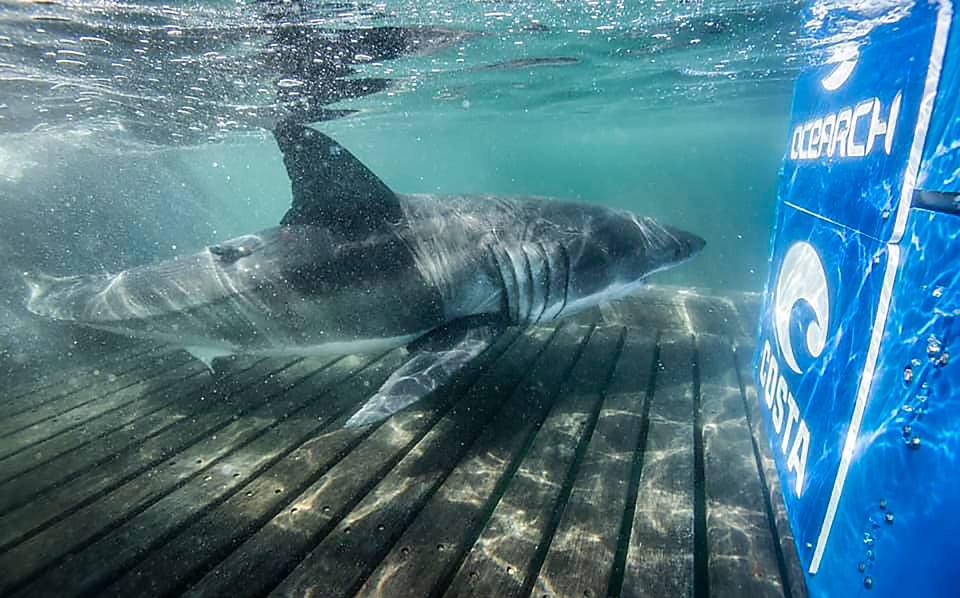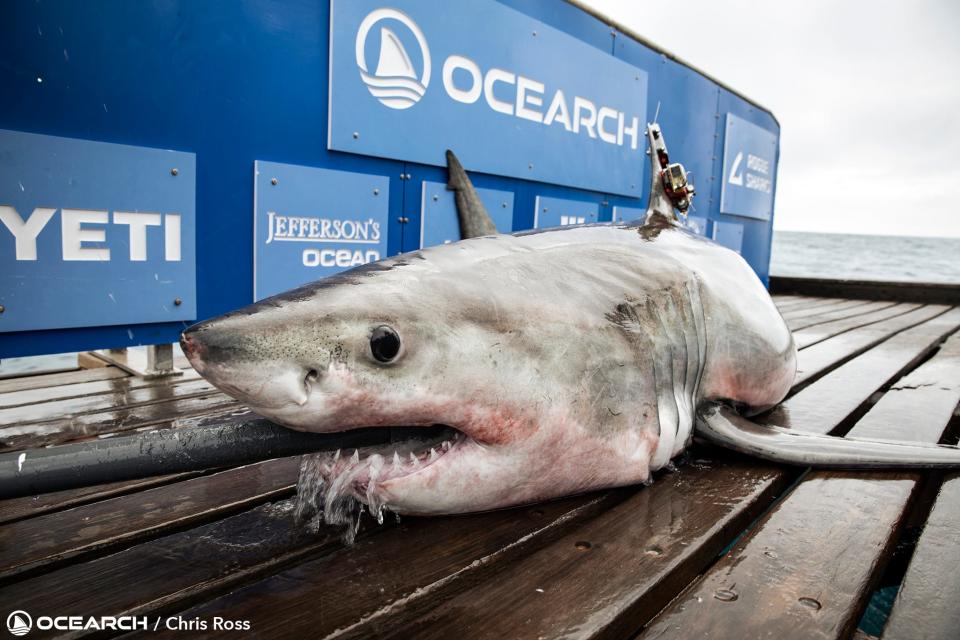10-foot great white shark 'Rose' tracked off Florida's Treasure Coast, near Stuart Saturday
A 10-foot great white shark, tagged by OCEARCH scientists in 2020, was tracked off the Treasure Coast Saturday night.
The shark, nicknamed Rose, pinged off the Stuart coast at 11:28 p.m., which means the satellite tag fastened to her dorsal fin broke the water's surface and sent the ocean predator's location to trackers.
Rose has traveled 14,788 miles since she was tagged. Her tracker shows Rose has spent her winters around Florida since 2021. She ventured into the Gulf of Mexico in 2022 and 2023 and in March of 2022 swam as far as the Panhandle, near Panama City.
In January, a 9-foot great white shark named Simon pinged twice off the Treasure Coast, off Vero Beach and Stuart.
Here's what to know about Rose, other sharks around the Treasure Coast, OCEARCH and white sharks in Florida:
More about OCEARCH white shark Rose

Rose was captured and tagged by OCEARCH researchers off Lunenburg, Nova Scotia on Oct. 4, 2020.
At that time, she measured 10 feet 5 inches, weighed 600 pounds and was classified as a juvenile shark.
Great white sharks can grow up to 20 feet long, but most are smaller with males averaging 11 to 13 feet.
According to OCEARCH, she was named after Rose Bay near where she was tagged.
Great white shark Simon tracked off Vero Beach, Stuart in January

On Jan. 17, a 9-foot 6-inch, 434-pound male white shark nicknamed "Simon" pinged off Vero Beach. He then traveled south and pinged near the Stuart coast three days later, on Jan. 20.
The juvenile shark was caught and tagged off St. Simon's Island, Georgia on Dec. 4, 2022, during OCEARCH Expedition Southbound.
Simon is known to have traveled 4,000 miles alongside an 8-foot shark "friend" named Jekyll, surprising scientists who previously believed sharks preferred only their own company.
But Simon and Jekyll may have parted ways.
Simon's tracker shows his last ping in the Gulf of Mexico off Marco Island on Feb. 4, while Jekyll's was on Feb. 7, off Jupiter Island and on Jan. 20, Jekyll pinged off South Carolina less than a day before Simon was tracked off Florida's Treasure Coast.
Why do great white sharks come to Florida?
Yes. White sharks migrate south when the water gets cold and food sources become scarce up north, according to OCEARCH chief scientist Dr. Bob Hueter.
Think of them as the snowbirds of sharks.
Most of them tend to stay away from the beaches in continental shelf waters, Hueter said.
What is OCEARCH?
OCEARCH is a nonprofit research organization studying the ocean's giants.
The group studies great white sharks and other keystone species essential for the health of the oceans.
OCEARCH recently finished up its 46th expedition, dubbed Expedition Southeast. It departed from Jacksonville on Nov. 17 and made its final docking in Morehead City, North Carolina on Dec. 15.
During the expeditions, researchers collected previously unattainable data on the animals' migrations, reproductive cycle, genetic status, diet, abundance, and more.
"If we lose the apex predator (sharks) then we lose all our fish and then there are no fish sandwiches for our grandchildren," OCEARCH founder Chris Fischer told the Courier Journal. "That's oversimplified, of course, but the idea is important because many shark species are threatened by overfishing and a demand for shark fins in Asia. Their dwindling numbers jeopardize ocean habitats."
Most shark attacks happen in Florida
There were 69 documented unprovoked shark attacks around the globe in 2023. The U.S. led the world with 36 attacks and Florida again was the state with the most bites at 16.
Florida shark attacks by county:
Miami-Dade County: 1
Pinellas County: 1
While the U.S. has the most attacks, South Africa has the most shark-related fatalities.
Since 1992, there have been 1,232 shark bites worldwide, according to data from floridapanhandle.com, with white sharks credited as the top biters.
Support local journalism by subscribing to a Florida news organization.
This article originally appeared on Fort Myers News-Press: Great white sharks in Florida: OCEARCH 10-footer pings off Stuart

